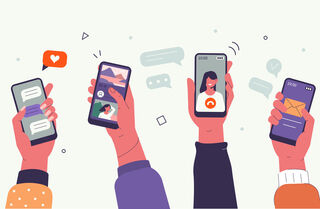Media
Social Media Can Damage Mental Health
Here’s how we can change that.
Posted September 9, 2021 Reviewed by Tyler Woods
Key points
- There is a connection between poor mental health and social media usage.
- We need to lessen the impact social media use is having on our health, particularly that of our teens.
- Many people know that social media use is correlated to increased anxiety, depression, and low self-esteem, yet few want to make any changes.
With alarming frequency, the research reports hit my inbox, my newspaper, and—yes—my Twitter feed.
“Excess screen time impacting teen mental health”
“Teens around the world are lonelier than a decade ago. The reason may be smartphones.”
“This Is Our Chance to Pull Teenagers Out of the Smartphone Trap”
And that’s just from the last few weeks.

As a parent and as a professional who works in the field of education, the connection between poor mental health and smartphone usage—and more specifically, social media apps—is downright scary. That more doctors, schools, governments, and community groups aren’t speaking out is disheartening.
A recent piece from Helen Lee Bouygues recommends we declare social media a public mental health crisis and wage a campaign against it, much like we did with tobacco. I often work with Bouygues’s Reboot Foundation and wondered: What would that look like? What would it be like to have a public campaign?
For starters, it would include PSAs, educational outreach, both short-term and long-term research, and age restrictions on who can use social media platforms, according to Bouygues.
While I’m not sure that would work in my house, or with the teens I know—they’re too practiced to be dissuaded by a warning label, and too tech savvy to be defeated by an age restriction—I do think Bouygues is generally right. We need to mitigate the impact social media is having on our children’s mental health.
What we must do is give technology users, and teenagers especially, the critical thinking skills necessary to interpret what they see online, so that they can contextualize it and ultimately assess whether the latest meme or trending topic is worth their time or consideration.
This past spring the Reboot Foundation surveyed more than 1,000 Americans on their social media usage and its impact on their mental health, and the results were alarming. More than half of the people who took part in the survey acknowledged that their social media use intensified their feelings of anxiety, depression, or loneliness. They also knew that it contributed to feelings of low self-esteem and made it harder for them to concentrate.
So what did users do about this? Basically, nothing. Only about a third said that they took steps to limit their social media use. That same survey revealed that 40 percent of the respondents said they would give up their cars, TV, and their pets before they would give up their social media accounts.
See what we're up against?
Critical thinking begins with reflective thinking. This requires us to step back and examine our own thinking process, and to notice when we are thinking irrationally or unproductively. This type of thinking is also called “metacognition.”
Social media apps and platforms were designed to discourage reflective thinking. The algorithms that control our feeds have been perfected to supply their users high octane emotional content that’s easy to share and amplify, regardless if it’s good for society, or for your mental health.
Teaching young people to be reflective thinkers would give them tools to resist conclusions based on raw emotion or knee-jerk reactions. This would go a long way to helping slow the spread of harmful content online.
Another way improved critical thinking skills would help address the mental health crisis teens face online is by giving them the confidence to think independently and to resist group pressure. This cool, rational thought is often called objective thinking and allows users to free themselves of the “hivemind” and to recognize that just because something is trending on Twitter doesn’t mean it’s worthy of your attention.
In short, good critical thinkers reflect on and correct their thinking. They’re objective and rational, even when things get heated or the facts get muddy.
Heated arguments and muddy facts. Doesn’t that sound like social media these days?
The good news is that these critical thinking skills can be taught and there is overwhelming public support for doing so. The bad news is that most schools don’t teach these skills very well.
That needs to change. Our’s kids’ mental health depends on it.


